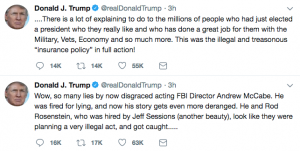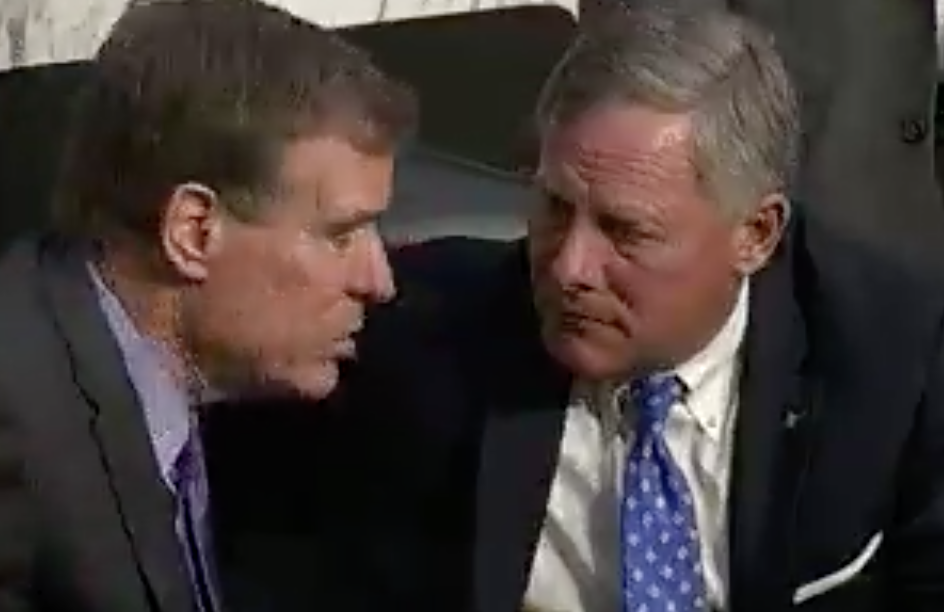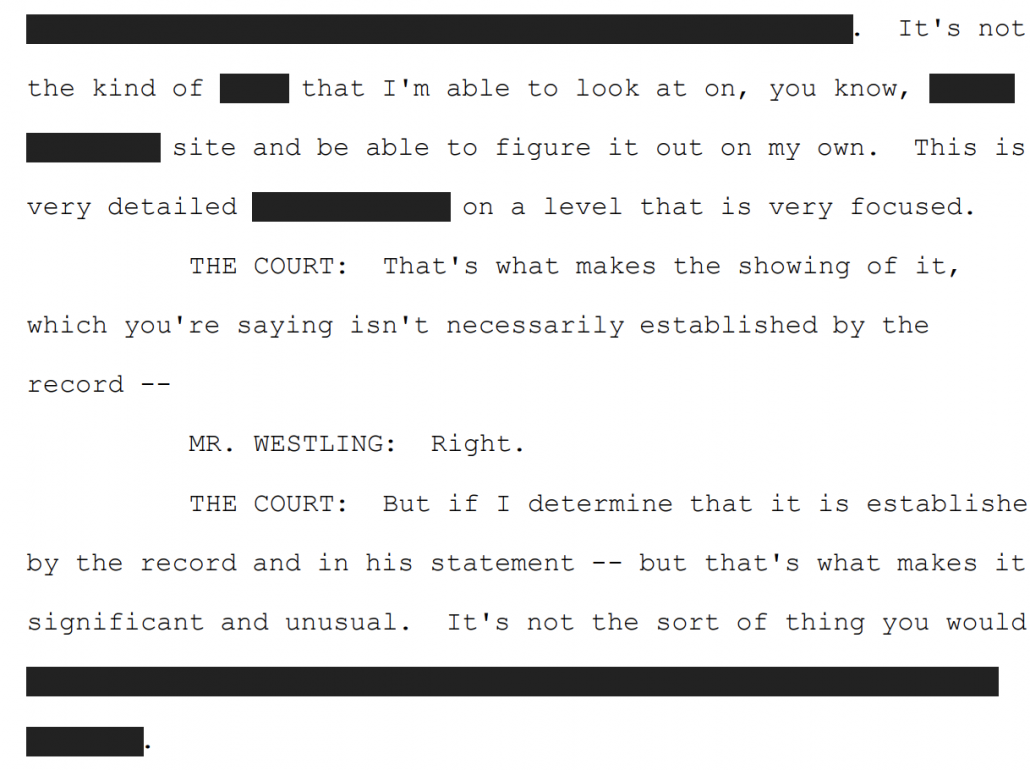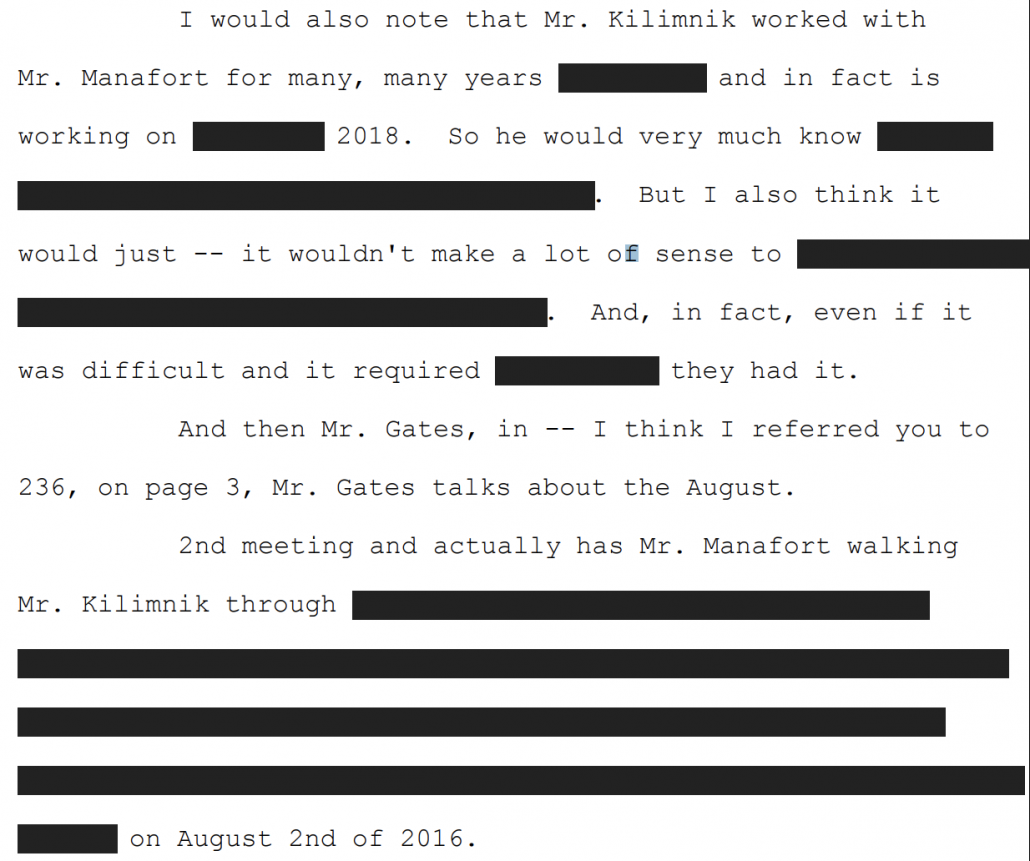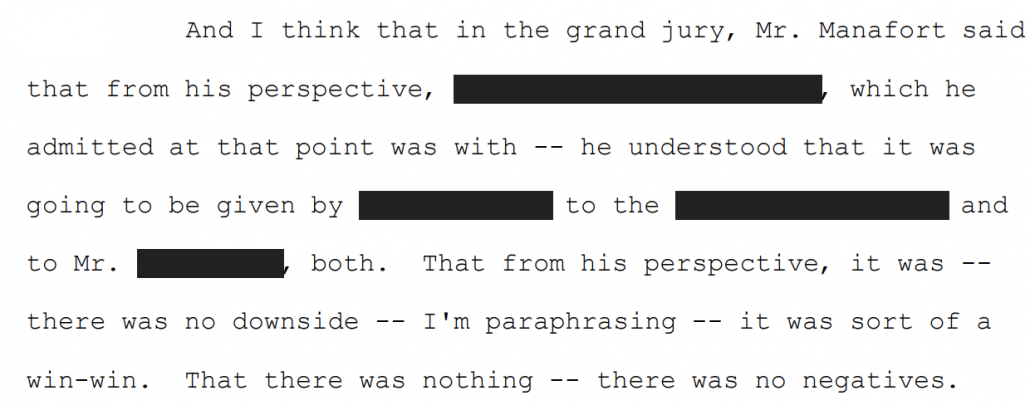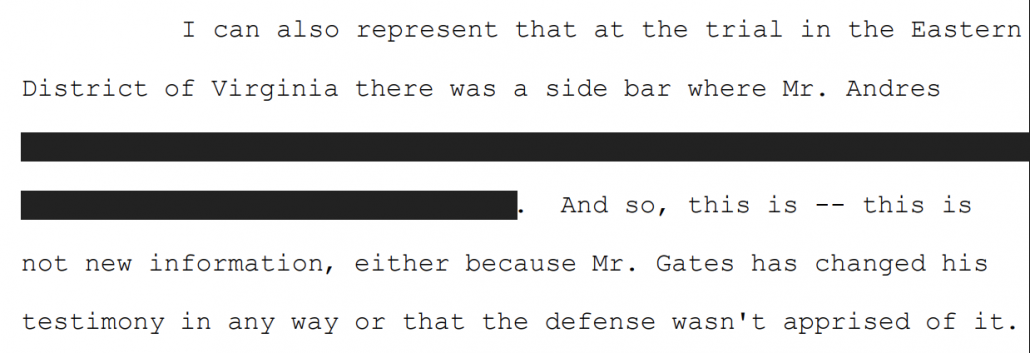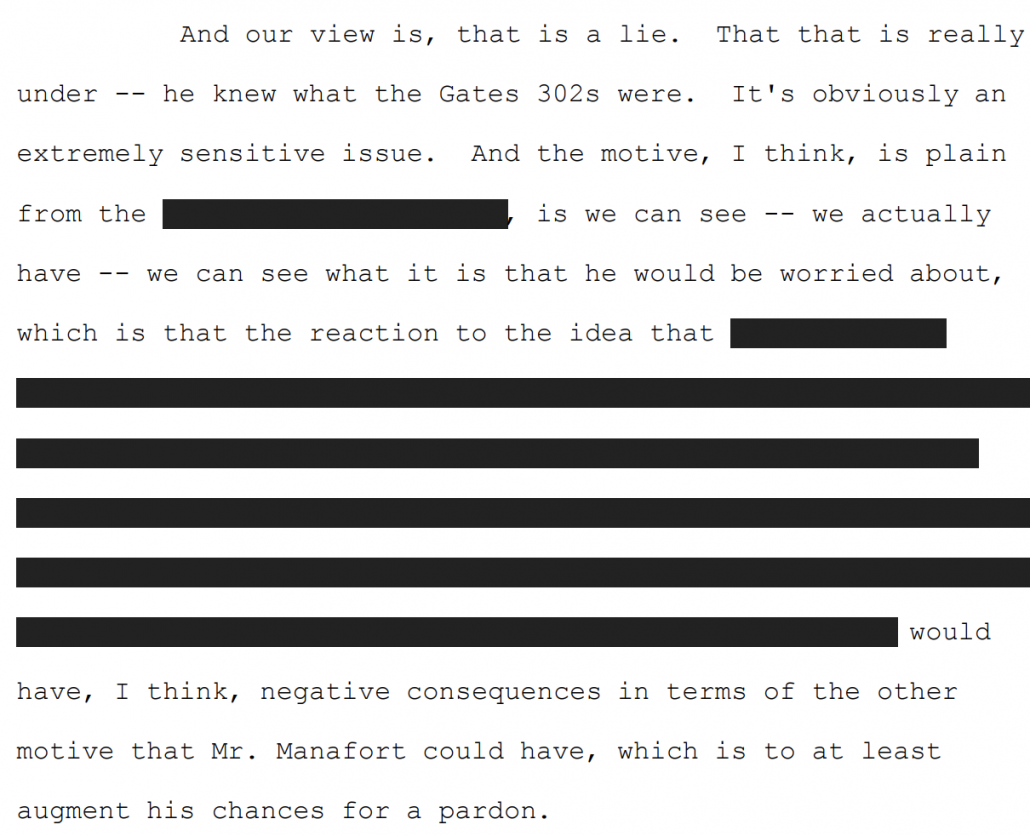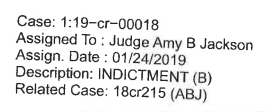How Amy Berman Jackson Got Roger Stone to Step in It and Then Step in It Again
As you no doubt have heard, Amy Berman Jackson imposed a gag on Roger Stone yesterday in response to his posting a picture of her with a cross-hairs on it.
But I’d like to look at how she did so, not just because of the way she crafted it to withstand what may be a legal challenge from Stone’s lawyers, but for how she got Stone on the hook for lies that may get him jailed anyway.
At the beginning of the hearing, she puts Bruce Rogow, Stone’s attorney, on the record about several issues. She gets him to certify that the post in question came from Stone’s Instagram account, as well as the timing of its posting and removal.
THE COURT: And I note that the defendant is present. Who’s going to be handling the argument for the defendant?
MR. ROGOW: I am, Your Honor.
THE COURT: Okay. Well, why don’t you remain there. And you can be seated, Mr. Farkas. Mr. Haley, could you please provide a copy of something that I’ve marked as Exhibit A to Mr. Rogow?
MR. ROGOW: Received, Your Honor. I have a copy.
THE COURT: I would like to know if Exhibit 1 is the Instagram post for which the defendant docketed the notice of apology, found at docket 38, on February 18, 2019?
MR. ROGOW: It is, Your Honor.
THE COURT: So, Roger J. Stone, Jr. is the defendant’s Instagram account?
MR. ROGOW: Yes, sir — yes, ma’am. I’m sorry.
THE COURT: And the post depicted in Exhibit 1 was posted and later removed on that Instagram account on or about February 18?
MR. ROGOW: It was.
THE COURT: Okay. You can return the exhibit to the deputy clerk. And it will be sealed and made a part of the record in this proceeding. I’m not done with you. So what is your position on behalf of the defendant on whether the media contact order in this case should be modified? [my emphasis]
It probably didn’t help matters that Rogow — who has already broken local rules twice in this case — misgenders ABJ. And from the transcript he seemed surprised she was having him — an officer of the court — certify these things from the start.
Rogow tries to deliver his flourish — that he (insanely!!) was going to put Stone on the stand. ABJ lets him, but then proceeds to get him to restate the basis for his objection to a gag. Rogow presents it as a strict prior restraint issue, arguing that as a defendant Stone should have even more right to speak than a member of the press would.
MR. ROGOW: My position is that it should not be modified, that Mr. Stone should have another opportunity to comply. And I want to put Mr. Stone on the witness stand so that he can — you can hear him, Your Honor, and hear him explain what happened, why it happened, and how he apologizes for it, as he did in that filing a couple of days ago. But he would like to have another opportunity to comply with this Court’s original order. And I think that is our position with regard to that.
THE COURT: All right. Well, if you choose to put Mr. Stone on the stand, I’m going to give you that opportunity. I do have a few questions for you first, and then I may save my other questions for Mr. Stone. In docket 28, your submission in response to my solicitation of submissions about the media contact order, you relied heavily on Nebraska Press Association, a case involving prior restraints on the press. Does the — and I don’t know if it’s pronounced Gentile or Gentile or Gentile case — indicate that Nebraska — the Nebraska Press test, the clear and present danger test that you hung your hat on, has to be applied when the restraint is on a participant in a criminal trial?
MR. ROGOW: It does not.
THE COURT: All right. So how does it apply then in this situation?
MR. ROGOW: It applies by analogy. And I think even stronger with regard to a defendant which is on trial for his or her freedom. The Nebraska Press case, of course, deals with restraints upon the press. In a situation with Mr. Stone, we’re talking about a restraint upon the defendant. The Supreme Court has never addressed the restraint upon the defendant in the First Amendment context, as far as I’m aware, which is what I said in my filing to the Court.
That’s when ABJ makes her move. She asks him how this prior restraint issue applies under the Bail Reform Act, which requires a judge to use the least restrictive means to keep a trial and the public safe. Rogow doesn’t understand where she’s going, so concedes that the Bail Reform Act permits her to impose new conditions to keep the community safe.
THE COURT: All right. He’s currently on bond pending trial on an indictment charging multiple felonies, and subject to conditions of pretrial release. How do the principles that you’re talking about operate in connection with the Bail Reform Act?
MR. ROGOW: Well, they operate to the extent that the Bail Reform Act focuses on whether or not there is a risk of flight or a threat to the community, for the most part. And in this situation there is neither a risk of flight nor a threat to the community. The question in this case is whether or not there was a violation of this Court’s order, an order that the Court entered, with warnings. And Mr. Stone will address that. But our position is that the Bail Reform Act is not the issue in this case in terms of revocation of the conditions of his release.
THE COURT: Well, what if I want to modify the conditions of release? What’s the test for what a Court has to find to impose a condition of pretrial release that’s necessary to protect another person or the community? [my emphasis]
Rogow then introduces a standard — clear and present threat — that has no basis in case law, which ABJ calls him on, which he immediately concedes, then tries to reclaim.
MR. ROGOW: Well, if you found that there is a real threat to another person in the community, an actual clear and present threat to that person, then of course you could apply Your Honor’s power to restrain that person, including revocation of the conditions of release, or change of the conditions of release.
THE COURT: Where does the Bail Reform Act require a clear and specific threat to a specific person?
MR. ROGOW: It doesn’t require in those terms, a clear and present threat, Your Honor, but —
THE COURT: Right. You keep using those terms, and now you’ve told me that it hasn’t been applied in this situation to a participant in the trial and it doesn’t apply in the case of the Bail Reform Act. So why do you keep using that test?
MR. ROGOW: Because I think the test is the proper test to use in a situation where a person is about to go on trial, and is a defendant in a case, and has a right to bail, a right to release on conditions that the Court sets. And so it seems to me that at that point, if the Court is going to not allow him or her to be released, that there ought to be very specific facts. I use clear and present because clear and present seems to be a test that gets applied in many situations where important liberty interests are at stake. [my emphasis]
So she asks him again for case law, and he defers by saying he didn’t expect her to raise this issue because it’s not within the basis of his own argument against a gag.
THE COURT: All right. And what is the best legal authority you have for the theory that you’ve just laid out?
MR. ROGOW: Well, I didn’t have any legal authority on that issue because that was not the subject of my response with regard to the gag order. So I really don’t have any authority off the top of my head, Your Honor, to tell you what case or what statute holds with regard to the conditions of release in a situation like this. And I’m focusing on a situation like this, where you have a specific single instance where this occurred.
Having gotten him to admit that — at least as he stood there, not realizing where she was headed — he had no case law to dispute her, ABJ then gets Rogow on the record regarding how much of what he did claim — that Stone was effectively a journalist — really pertained to speech he needed to conduct for his livelihood.
THE COURT: You said the following in your very impassioned submission about the proposed media contact order: You said, “While it is true that most criminal defendants do not wish to be heard, either publicly or in the course of their trial, Mr. Stone is not such a defendant. His work, for more than 40 years, has been talking and writing about matters of public interest. “He’s published half a dozen books, many stating controversial viewpoints. He’s penned many hundreds of articles and has been the subject of many hundreds more, published in myriad publications. Whether it is his pursuit of a posthumous pardon for Marcus Garvey or the style of his clothes or the state of the nation, Roger Stone is a voice. “Given those realities, a prior restraint of Roger Stones’s free speech rights would be an unconstitutional violation of Stone’s right to work, to pursue his livelihood, and be a part of the public discourse.” That raised some questions in my mind, particularly in the wake of the recent events and his explanations for them that may bear on his conditions of release. And so my first question is: How exactly does he pursue his livelihood? [my emphasis]
ABJ gets Rogow to distinguish Stone’s blather from the things he gets paid for — effectively, PR. Rogow then proceeds to certify that his client is an expert of sorts in PR.
MR. ROGOW: He consults with different business and other political persons. That is one of his kinds of work. The other is he comments, obviously, and gets paid for his commentary. He speaks and gets paid for his speaking.
THE COURT: All right. So when he consults, he consults on the subject of communications or public relations? Is that his —
MR. ROGOW: It could be. It could be both.
THE COURT: — field of expertise? All right. Now, he told Pretrial Services Agency he was employed at Drake Ventures, LLC. So what is the nature of the work for which he reported an income of $47,000 a month? Is that the communications consulting?
She establishes a few more details about Stone’s business, then permits Rogow to call Stone to the stand — but not before she warns him that Stone will be sworn (Rogow knows that, but this will be important if and when he gets charged for lying on the stand) , then also warns Rogow she’ll have questions for him again when Stone is done.
THE COURT: All right. So as long as you understand he’s going to be subject to cross-examination. I have a number of questions. If you are saying to me that you would like me to pose them directly to your client, instead of to you, I will do that; he will be sworn.
MR. ROGOW: I am saying that, Your Honor.
THE COURT: All right. You can call Mr. Stone to the stand. I may still have questions for you after, since you entered your appearance in this case.
MR. ROGOW: I understand, Your Honor.
THE COURT: And I expect you to be able to answer my questions. All right. You can call your client to the stand. Understand that the United States will have the right to cross-examine him in the scope of his direct.
MR. ROGOW: I do. I do.
THE COURT: All right.
Remarkably, Rogow seems unprepared when ABJ tells him to go first.
MR. ROGOW: Thank you.
THE COURT: You may proceed.
MR. ROGOW: May I remain? I thought Your Honor was going to ask the questions.
THE COURT: You can start.
What happened next has been the focus of most of the coverage of this. Under Rogow’s direction, Stone tried to appear sorry. ABJ interjects, when Rogow tries to tie Stone’s livelihood to his speech, to challenge that.
Q. How could we be assured, Mr. Stone, if the Judge remains with the order that she had entered allowing you to speak freely, how can we be assured that there will not be a recurrence of something like this, or anything like this?
A. First of all, I’m very grateful to Your Honor for the initial order, because I do have to make a living. And I am sorry that I abused your trust. I —
THE COURT: Is anybody paying you to speak about this case?
THE DEFENDANT: No.
THE COURT: Okay. So an order that you couldn’t speak about this case wouldn’t affect your ability to make a living?
THE DEFENDANT: That is correct.
When Rogow finishes, ABJ then gets Stone on the record about several issues: who owns the Instagram account, what he claimed the crosshairs to be. Then she notes that Stone’s public comments about what he had done differed from what his lawyers had gotten him to sign in the apology they submitted to her. She gets Stone on the record trying to square what he had said publicly with what he and his lawyers had represented to her.
THE COURT: Well, according to the apology, the post was improper. What was improper about it?
THE DEFENDANT: My attorneys wrote that and I signed it because it was improper for me to criticize at all; I recognize that.
THE COURT: Well, at the time I imposed the order there were no restrictions on your talking about the case. So, my questions to you are not about the fact that you criticized the office of special counsel, that you criticized me, that you criticized an opinion in the case that I had written earlier. My question to you is what is it that you said was improper when you told me it was improper.
THE DEFENDANT: Again, I did not write that, I signed it on the advice of counsel. I would have —
THE COURT: Well, wait.
THE DEFENDANT: Yes.
THE COURT: You said to me, “I abused your trust.”
It goes on for a bit, leading up to ABJ getting epic rat-fucker Roger Stone to agree, under oath, that his post could have a malicious impact, regardless of what he himself claimed to intend by it.
THE COURT: Why is it consistent with how sorry you were, when you sent the apology, to continue for the next two days to speak publicly about the fact that you’re being treated unfairly in this situation as well, that it’s really this symbol, that it’s really that symbol, it’s the media going after you. How is that consistent with your telling me that you’re deeply and sincerely sorry?
THE DEFENDANT: Because that was a reference to what I believe was a media distortion of my intent. It was — I did not have a malicious intent, Your Honor.
THE COURT: Do you understand that what you did could have a malicious impact, notwithstanding your intent?
THE DEFENDANT: That’s why I abjectly apologized and I have no rationalization or excuse. I’m not seeking to justify it.
DC prosecutor Jonathan Kravis then gets Stone on the record about a bunch of things I’m sure the FBI is busy at work to prove to be false claims, such as who found the photo of ABJ with the crosshairs, which device was used to post it, which Proud Boy “volunteer” he worked with to make a threat against a judge. This is important, not just because the FBI is likely to find several issues about which Stone lied under oath yesterday (which if they can prove will provide immediate reason to deny Stone bail), but also because much of the eventual case (and much of what Mueller’s team spent a year getting all of Stone’s retinue on the record about) will be about proving what Stone personally tweeted or otherwise communicated, and what someone else did.
ABJ interjects a few times, including to call him on an attempt to use the passive voice to avoid saying something that the FBI will be able to prove is a lie.
THE COURT: When you say, “My phone is used,” who’s the subject of that sentence? The passive voice is not helpful. Who uses your phone to post?
THE DEFENDANT: All of the people who work for me.
She also gets Stone to contradict earlier testimony about who picked the photo. She gets Stone on the record affirming that he stated to InfoWars that the media was making him a target. She calls Stone on a bullshit claim about five people being too many to know who had access to his phone.
Stone really wasn’t prepared to be grilled by ABJ.
Just to be fair to Bruce Rogow, note that when ABJ asks Kravis for what the government wants, he doesn’t realize what she has just done, either. He still believed, at this point, that this was a question about the jury pool.
That conduct amounts to what the Court in United States versus Brown referred to as, quote, a desire to manipulate media coverage to gain favorable attention, unquote, thereby threatening to taint the jury pool. The defendant, even after the Instagram post was taken down, continued to give interviews where he reiterated the statements that appeared in the text of the message. He gave varying accounts of who was responsible for the post, what the symbol meant, where it came from, so on and so forth. And every time the defendant gave another one of those interviews, he continued to amplify the media coverage and increase the risk — increase the risk to the jury pool.
After Kravis argues jury pool jury pool jury pool, ABJ finally guides him to where she’s headed: the the safety of the community. Kravis doesn’t get the hint, and returns to the jury pool, before — lightbulb! — he notes that Stone’s comments might be deemed threatening and therefore appropriate for restrictions under the Bail Reform Act.
THE COURT: All right. Looking at the Bail Reform Act, however, under 18 U.S.C. Section 3142(g), when I’m considering imposing conditions on someone’s release, I’m supposed to consider the available information concerning the nature and circumstances of the charged offenses, the weight of the evidence against the defendant, the history and characteristics of the defendant, and the nature and seriousness of the danger to any person or to the community that would be posed by the defendant’s release, or release without certain conditions. Is there anything you would like to bring to my attention in that regard, assuming that I would be considering making any restrictions on speech a condition of his release?
MR. KRAVIS: Your Honor, the facts that I would bring to the Court’s attention are the facts and circumstances surrounding the content of the post, in that whatever the defendant’s testimony about his subjective intentions may have been, the result of his conduct was the wide dissemination of an image that could be construed, could reasonably be construed by people as a threatening image, and that introduces a new threat of — a new threat of taint to the — taint to the jury pool.
And because the conduct we’re talking about now, because the message we’re talking about now are not just messages about proclaiming innocence or articulating a defense, but are messages that could be construed as threatening, the government believes that the restriction on extrajudicial statements would be appropriate under the Bail Reform Act.
ABJ gets Rogow on the record once more to walk him through how Stone’s actions prove his own claims from last week about publicity to be false.
That’s when ABJ takes a break, then comes back and imposes a gag not just to ensure her ability to seat a jury, but to preserve the safety of the community. She presents Stone’s speech, rightly, as an incitement (and neatly blames the wingnuts he hangs out with for any potential violence).
Under Section 3142(g), in determining whether there are conditions that will reasonably assure the safety of other persons or the community, I’m supposed to take into account a number of things, including the nature and circumstances of the charged offenses, the weight of the evidence against the defendant, the history and characteristics of the defendant, and the nature and seriousness of the danger to any person, or to the community, that would be posed by the defendant’s release. In connection with that assessment, you can’t overlook the fact that this indictment does not charge the defendant with financial or regulatory irregularities in connection with some business deal a long time ago. It’s not even limited to the allegations that he lied to the United States Congress. It specifically charges him with threatening witnesses, within the past year. Now, it’s true those allegations have yet to be proven. But for purposes of Section 3142, the evidence detailed in the indictment alone is quite compelling. And the evidence of the past few days indicates that this defendant has not been chastened by the pendency of those charges, and that in connection with this matter, he has decided to pursue a strategy of attacking others.
[snip]
What concerns me is the fact that he chose to use his public platform, and chose to express himself in a manner that can incite others who may feel less constrained. The approach he chose posed a very real risk that others with extreme views and violent inclinations would be inflamed.
Importantly, ABJ uses Stone’s own testimony to emphasize that he chose to use a threatening image, and he’s an expert so he surely didn’t do it by accident.
The defendant himself told me he had more than one to choose from. And so what he chose, particularly when paired with the sorts of incendiary comments included in the text, the comments that not only can lead to disrespect for the judiciary, but threats on the judiciary, the post had a more sinister message. As a man who, according to his own account, has made communication his forté, his raison d’être, his life’s work, Roger Stone fully understands the power of words and the power of symbols. And there’s nothing ambiguous about crosshairs.
So here’s what she did.
First, in spite of the fact that both the prosecution and the defense were treating this as primarily a jury pool issue (which ABJ did return to and establish in the record), she instead — from the start — laid the ground work to impose a gag because Stone’s public comments pose a threat to the community, giving her the authority to impose the gag under the Bail Reform Act. She makes clear that whether or not he intends violence, those around him might.
In the process, she did a number of things:
- Impose a gag that a Twitter account bearing Stone’s name may have violated within an hour
- Get Rogow and Stone on the record explaining why the terms of her gag won’t impact Stone’s ability to make a living, undercutting a significant part of the First Amendment claim they’ve been making
- Provide a basis for the gag that Rogow did not anticipate, which may be far harder — and politically more difficult — to challenge
- Provide an opportunity for both the prosecution and herself to catch Stone in multiple sworn lies (which, again, I’m sure the FBI is busy at work proving now), which if charged as perjury would lead to Stone’s immediate jailing
Here’s why, I think, this was allowed to happen. For Stone’s entire life, the press has coddled Stone, treating him as a nifty character whose toxic speech doesn’t damage society. ABJ was having none of that, and used both Rogow’s position as an officer of the court and Stone’s insane willingness to take the stand to get them to acknowledge that his speech is toxic, that it does pose a threat to society. Stone presumably wasn’t prepared for that because no one has called him on his toxic speech before.
If Stone’s lucky, the now much harder to challenge gag will be the only detrimental outcome from yesterday’s hearing and he’ll avoid perjury charges.
As I disclosed last July, I provided information to the FBI on issues related to the Mueller investigation, so I’m going to include disclosure statements on Mueller investigation posts from here on out. I will include the disclosure whether or not the stuff I shared with the FBI pertains to the subject of the post.



